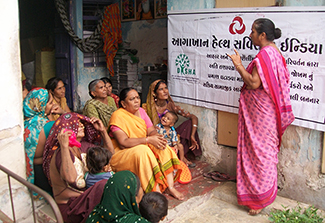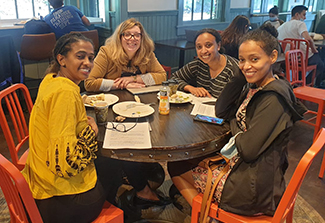Early career researchers in Ethiopia and India find common ground
July / August 2022 | Volume 21 Number 4
 Courtesy of CCDCIndia’s Centre for Chronic Disease Control is a collaborator in the COALESCE program. Pictured: Participants learn about a study at the Centre.
Courtesy of CCDCIndia’s Centre for Chronic Disease Control is a collaborator in the COALESCE program. Pictured: Participants learn about a study at the Centre.
Global health research trainees rarely encounter opportunities to develop their own South-South collaborations. The lucky few who fleetingly meet their counterparts from other countries usually do so at consortium meetings tacked onto the end of their training programs. “They always get a lot of value from talking to each other, there's a lot of opportunity for growth and learning there,” said Dr. Shivani Patel of Emory University. Recognizing this, she partnered with colleagues to create a program that brings scholars together from the very start of their training.
The result, the COllaborative Research, Implementation, And LEadership Training to AddresS Chronic Conditions across the Life CoursE (COALESCE) program, seeks to facilitate locally driven research and implementation by training 116 researchers and practitioners from India and Ethiopia.
An unlikely pairing of countries and continents it would appear. Yet the collaboration includes two of Emory’s long-standing institutional partners, India’s Centre for Chronic Disease Control and Ethiopia’s Addis Ababa University. “COALESCE is about creating a space to invest in yourself, right? In your daily life, no one's going to say: ‘let's talk about how to build a network’ or ‘let's talk about how to seek mentorship,’” said Patel, associate director of COALESCE.
She envisions a stepping-stone for budding researchers who aspire to conduct independent research addressing chronic conditions. "Our partners in Ethiopia and India tell us that opportunities for post-doctoral training that support the transition to independence are lacking,” said Patel. Without that support, early career researchers stagnate or leave research after years of assisting senior investigators instead of pursuing their own interests. “If we want science that addresses the needs of diverse populations across the globe, then we need to support scientists in becoming independent researchers.” This is “critically important” for growing local capacity and developing North-South and South-South collaborations, she said.
 Photo Courtesy of Emily ChubaThe Indian Fellows enjoy a welcome dinner with Emily Chuba, COALESCE program manager.
Photo Courtesy of Emily ChubaThe Indian Fellows enjoy a welcome dinner with Emily Chuba, COALESCE program manager.
Learning to lead
The pandemic stymied the first (2019) class of COALESCE, yet an innovative remote program still benefitted trainees. “In our first year, on the Ethiopian side we had more clinicians, whereas on the Indian side we had people more researchers,” said Patel. These differences in background and needs led to terrific conversations and diverse outcomes.
“As training director, I saw the Ethiopian fellows improve their abilities to think through scientific questions and present to scientific audiences. On the Indian side, I saw fellows build networks and grow collaborations.” Papers, pilot proposals and other deliverables—all delayed by the pandemic—are now coming to fruition. One trainee has already received funding from Wellcome Trust. Other indicators of the program’s success are the quality of applicants received in the second and third round and the number of applications, which “nearly doubled,” according to Patel.
Emily Chuba, program manager, said that, though COALESCE is strengthened by Emory’s “strong strategic partnerships” and previous global health programs, its scope is more expansive than those of the past because it emphasizes professional development. “We're focused on the part of science that’s ‘team’—how do you collaborate with others?” For example, trainees undergo assessments to gain self-awareness of how they communicate and “show up” as a team member, said Chuba. “They learn to lead.”
In addition to learning from expert researchers, COALESCE trainees will engage with health care stakeholders and representatives from the Ethiopian and Indian Ministries of Health. This added dimension should help to advance policies and enhance scientific capabilities in both countries, said Chuba. Meanwhile, the program will continue to provide a platform for previous Emory global health trainees to become mentors. “Our global health scholars see the value of capacity building and want to contribute to their home countries. Past trainees, who have returned to their institutions and worked their way up, are now poised to serve as mentors for a new generation.”
More Information
- Related Fogarty grant:
COllaborative research, implementation, And LEadership training to addresS chronic Conditions across the lifecoursE (COALESCE)
-
COALESCE, Emory University, Atlanta, Georgia, USA
-
Addis Ababa University (AAU), Addis Ababa, Ethiopia
-
Centre for Chronic Disease Control (CCDC), New Delhi, India
Updated August 12, 2022
To view Adobe PDF files,
download current, free accessible plug-ins from Adobe's website.
Related Fogarty Programs
Related World Regions / Countries
Related Global Health Research Topics